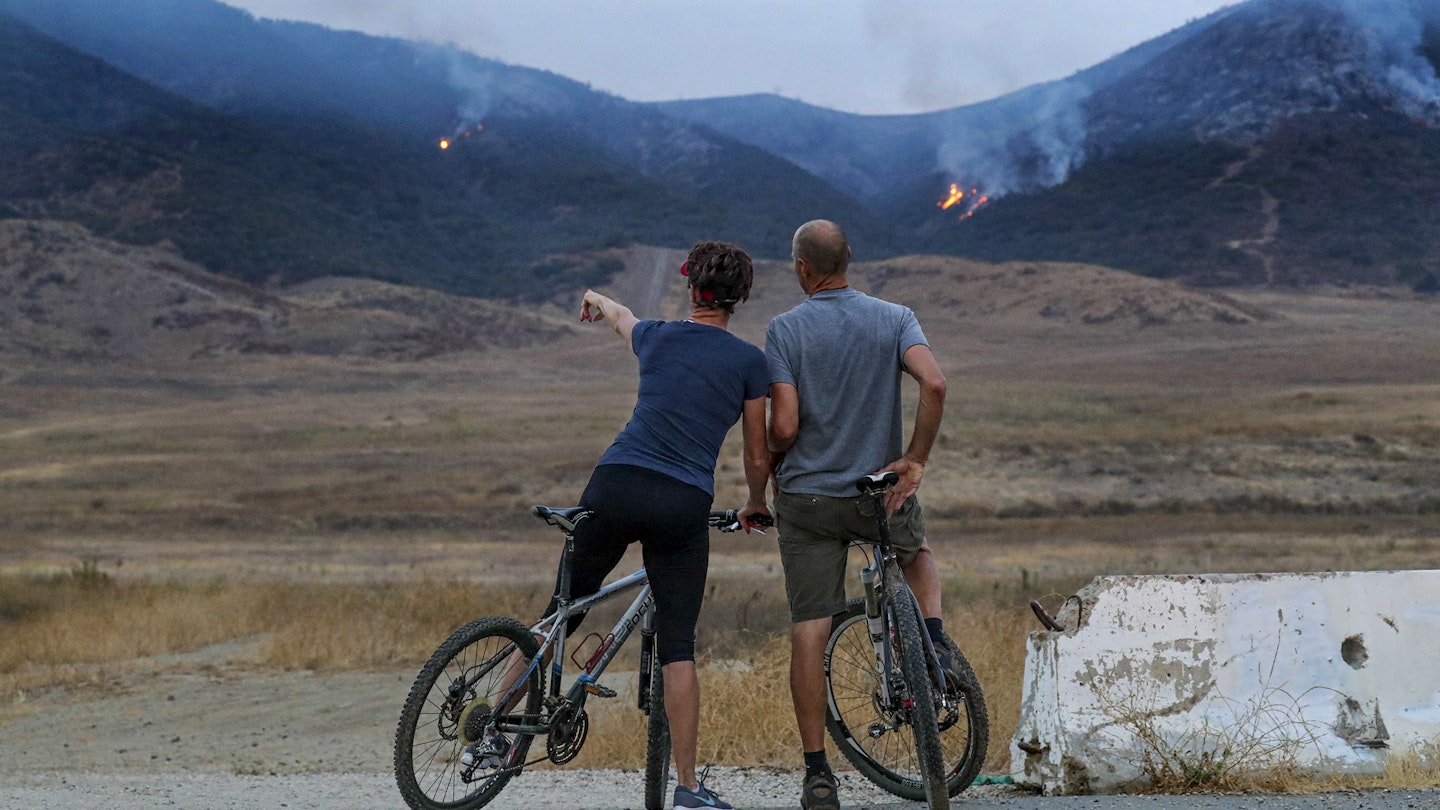Check Before You Go
Let’s start with the good news. In the digital age, there are a number of free tools people can use to double-check fire containment and air quality before ever boarding the plane. The World Air Quality Index offers a visual map highlighting which cities are most affected by pollutants, allowing visitors to zoom in to read current risk levels. An AQI of 100 or less is considered normal.
Another excellent resource is the LA Times’ interactive wildfire map. It provides a bird’s eye view of the state, detailing fire perimeters, hot spots, containment percentages, and air pollution in surrounding areas.
In addition, Washington, Oregon, and California recently launched WestCoastTravelFacts.org, a one-stop shop for everything you might want to know about safely traveling to these three states, particularly during fire season. It has real-time air-quality readings, live-cam feeds, and an array of itineraries covering the three states, along with emergency contacts and up-to-the-minute local news.
What to Pack
Unfortunately, a scarf wrapped around your face won’t do much except create a colorful, bohemian fashion statement. Cheap, surgical masks aren’t much better. For true protection from wildfire smoke, travelers to California will want to purchase an N95 mask designed to filter out very small particles, especially if they have heart or lung disease or are asthmatic.
Hotel Cancellation Policies
Sifting through a hotel or Airbnb’s wildfire cancellation policy can feel like wandering through a swamp of legalese, especially since it varies tremendously from place to place. For example, all hotels in Healdsburg, California offered refunds to travelers when the city was evacuated, but the rules for canceling simply due to smoke were much, ahem, hazier. Some offered the chance to rebook for free in six months, while others handled cancellations on a case-by-case basis if visitors had health concerns. The Travelodge mentioned a 72-hour cancellation policy year-round if visitors booked directly through their site instead of a third-party.
On Airbnb, cancellation policies all depend on the host you booked with, ranging from “flexible” to “super strict.” Historically, hosts have not made exceptions due to wildfire smoke unless the town itself has been evacuated. The safest bet is to book a space with the most flexible rules and then check the weather before your departure.
Trip Insurance
Most travel insurance companies do provide disaster relief, which should include wildfires. These policies are designed to refund costs incurred for three main things: if the hotel is uninhabitable, if your destination gets evacuated, or if your own home is damaged while traveling. Some insurance may also cover trip interruption (when 50 percent or more of a trip is missed due to natural disasters or mandatory evacuation).
Another option for peace of mind is making flight and hotel bookings via a travel-oriented credit card like Chase Sapphire Reserve, which offers built-in travel protection for severe weather, uninhabitable lodging, and trip delays.
Things to do During Fire Season
Though it may feel like the fires are affecting every major city in California due to the constant news coverage, the truth is that wildfires are usually quite localized, and daily life is proceeding normally. This means that even if a portion of a city or area you plan to visit is affected, there will be perfectly safe places to visit only a short drive away.
In Los Angeles, tourists looking to avoid fires in Malibu or the San Fernando Valley have a multitude of activities to choose from on the eastern side of the city. Notable attractions such as The Broad, the California Science Center, and the Los Angeles County Museum of Art (LACMA) are far away from the typical burn zones and offer a welcome, air-conditioned respite from the smoke-filled air.
Looking to enjoy some time outdoors? The San Gabriel Mountains provide a massive alpine playground full of towering pine trees and hills thick with chaparral, just one hour outside Los Angeles. When the recent Getty Fire was raging on the west side, the Air Quality Index in the San Gabriels remained good.
As for San Francisco, museums have stepped it up a notch for those looking to breathe easier. The San Francisco Museum of Modern Art (SFMOMA), Asian Art Museum, and the Bay Area Discovery Museum are offering free admission in early November to anyone seeking a smoke-free sanctuary.
California also boasts two world-class aquariums that are a fantastic option on days with poor air quality. The Aquarium of the Pacific in Long Beach is a must-see for families visiting Southern California, while the Monterey Bay Aquarium to the north offers a rare look at the kelp forests and marine life of the Pacific Coast.
The bottom line: If you check the air quality and fire maps in the week leading up to your trip, you’ll have a fairly accurate idea of conditions when you arrive in California. And, even if the winds suddenly shift, there are still dozens of wonderful and unique indoor activities to explore.




